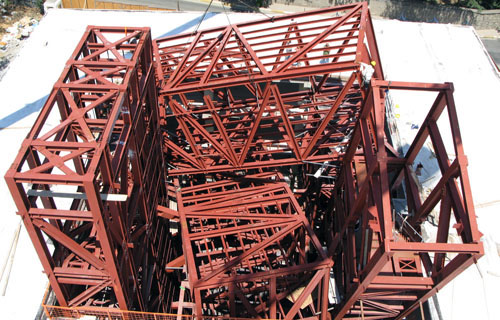728x90

PROGRAM Headquarters for a Turkish fashion house?including offices, showrooms, conference rooms, auditorium, museum, and dining hall?as well as the television studios, radio production facilities, and screening rooms of its media sister-company
AREA 5,400 m² (58,000 sf) and 3,700 m² (40,000 sf)
COST Confidential
STATUS Commenced 2007; under construction; completion expected 2008
ARCHITECT REX
KEY PERSONNEL Erez Ella, Tomas Janka, Mathias Madaus, David Menicovich, Tsuyoshi Nakamoto, Joshua Prince-Ramus, Ishtiaq Rafiuddin, Tieliu Wu
CONSULTANTS ARTE, Autoban, Buro Statik, Cedetas, Dora, Eleksis, Front, Gurmen Muhendislik, Lamglass, Norm Tecnic, Say Yapi, STEP, Superpool, Cem Mimarlik



























The glass skin shows an innovative work, that results in a very light skin.
Architect´s description:
In December 2006, Caltech’s senior administration suddenly changed, and REX’s design for the Annenberg Center for Information Science and Technology was canceled.
Two months later, the CEO of Vakko (Turkey’s pre-eminent fashion house) and Power Media (Turkey’s equivalent of MTV) approached REX with plans to design and construct a new headquarters by the year’s end using an existing, unfinished hotel. The requested timetable would normally have been absurd. However, the unfinished building fortuitously had the same plan dimension, floor-to-floor height, and servicing concept as the Annenberg Center’s “Ring.”
By adapting the Construction Documents produced for the Annenberg Center to the abandoned concrete hotel skeleton, construction on the perimeter office block commenced only four days after Vakko/Power first approached REX. This adaptive re-use opened a six-week window during which the more unique portions of the program could be designed simultaneous to construction. Speed became the design’s most significant parameter.
Whereas the Annenberg Center’s Ring was a fragile, post-tensioned concrete structure which depended upon the robust, steel interior for support, Vakko/Power’s existing Ring is painfully over-designed, the byproduct of numerous, deadly earthquakes in Turkey. The design problem is therefore reversed: Vakko/Power’s unique interior must remain detached so as not to disrupt the structural integrity and waterproofing of the in situ skeleton. Dubbed the “Showcase,” this unique interior houses the showrooms, meeting spaces, auditorium, and gallery.
Meanwhile, the upper floor of the skeleton’s subterranean parking houses Power Media’s television and radio studios, which require acoustic damping and light control.
REX only had two weeks to submit the steel mill order after starting the project. Therefore, a concept for the Showcase was developed that established the general steel shapes and quantities while still allowing the design to evolve significantly.
To this end, REX and its engineers devised steel boxes that could be assembled in myriad configurations while retaining the Showcase’s structural self-sufficiency.
Ultimately, program adjacencies and code/exiting requirements dictated the final stacking of the boxes. The slopes of the auditorium, museum, and meeting rooms create a circulation path that winds from top to bottom of the Showcase. The Showcase is clad in mirror-glass, creating a “Cabinet of Dr. Caligari” that both repeats and fractures the image of the occupant.
Creating an exceptional new headquarters was critical to maintaining Vakko/Power’s public image; yet, absorption of the clumsy, existing structure was impossible to hide given the time constraints. REX therefore proposed to make the glass facade as thin and immaterial as possible, such that the hotel skeleton is exposed, not hidden.
By slumping a structural “X” into each pane, the glass’s strength is increased, its need for perimeter mullions is eliminated, and its thickness is reduced.
The result is an ultra-thin sheath of glass that wraps the existing skeleton. This ethereal Saran Wrap subtly reveals the pre-existing concrete skeleton and suggests the Showcase behind.



from archdaily
그리드형
'REF. > Architecture' 카테고리의 다른 글
| [ Studio Shift ] Retail Center (0) | 2010.03.02 |
|---|---|
| [ SCDA Architects ] Alila Villas Hadahaa (0) | 2010.03.02 |
| [ FAR frohn&rojas ] Wall house (0) | 2010.03.02 |
| [ XTEN Architecture ] Openhouse (0) | 2010.03.02 |
| [ Jager Janssen architecten ] House Dijk (0) | 2010.02.27 |